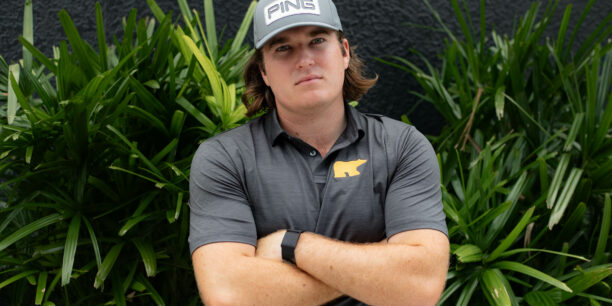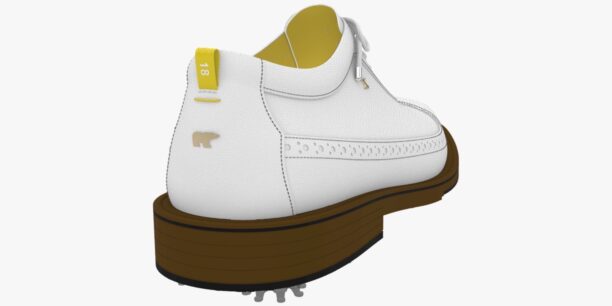Dan Patrick: I saw just a portion of this last night—I was watching Live From the Masters on the Golf Channel. Golf Channel’s three-part documentary, Jack, which airs Sunday at 9:00 p.m. Eastern. The definitive film on Jack Nicklaus focuses on “Nicklaus the Prodigy” in Part I. Part II, “Nicklaus in His Prime,” and Part III, “Jack’s Legacy,” air at 9:00 p.m. the following two nights, so it’s a three-night event with Jack Nicklaus. The three-part documentary called Jack starts Sunday night following the Masters festivities.
Jack joins us now. Good morning, Jack. How are you?
Jack Nicklaus: I’m good, Dan. How are you doing?
Patrick: I’m doing okay. If you weren’t a golfer, what do you think you would have become?
Nicklaus: Well, I think I would have been involved in sports someplace. I think baseball was probably my best sport growing up, but I quit it too early, which was okay because golf was conflicting with it. I tried all of the other sports, and by process of elimination, golf turned out to be the best thing for me.
Patrick: How important was your Dad in steering you to golf?
Nicklaus: He didn’t steer me anyplace—but he did introduce me. My Dad played professional football, and he played football, basketball, and baseball at Ohio State. You know, they did that in those days. He liked golf, but golf was not his number one choice. But, once I started playing with him, it became his number one choice.
Patrick: You can be competitive in football, basketball, or baseball and be competitive against your opponent. With golf, you’re competitive with yourself and the course.
Nicklaus: That’s right.
Patrick: Was that ever something that was maybe a little tougher to master? Because you’re not really competing against somebody who you’d tackle or block.
Nicklaus: Well, that’s what I actually liked about it. With other sports, you needed somebody with like skill, I suppose you might say, to compete against. In golf, the skills you competed against were your own skills and how far you could develop them. You could develop them on your own time. You could go out early in the morning and come home late at night. You could play golf all day. Other sports, you’re limited to how much practice time was available or how much a competitor would play you. I suppose that’s why I gravitated to golf. I was a sports nut. If I could be out all day and come home when my mom grabbed me by the ear, that’s what I did.
Patrick: Did you lift weights at all?
Nicklaus: No. Back when I was playing, even football players didn’t lift weights. I started working with weights probably when I was about 40 years old—just light weights to try to keep toned.
Patrick: Can you be too in shape—too toned—in golf?
Nicklaus: No, I don’t think you can be too toned in anything. Golf is a game of long, loose muscles. It’s a game you like to be as supple as you can. I never believed in having really tight, strong muscles. I thought that limited your ability to have a loose swing, which I think you need to have. I was always very careful with what I did with weights or anything else. I was pretty strong, but most of my exercise revolved around playing other sports while I was playing golf. I played in a basketball league until I was 40 years old. I played a lot of tennis and I did a lot of water skiing and snow skiing. I did all kinds of things that would benefit different parts of my body, but would never tighten me up.
Patrick: He’s Jack Nicklaus. The three-part documentary, Jack, airs Sunday night following the Masters. How much fun was it to sit down, do the interviews, and look back?
Nicklaus: Oh, I enjoyed it. The producer, Izzy DeHerrera, was just terrific. Izzy did a great job. He was funny and he kept it light. I spent around eight to 10 hours doing interviews. We had a lot of fun with it and I think the crew had a lot of fun. I have not seen very much of it yet. I’ve seen just a little trailer that showed a couple minutes of it. What I saw was very good, but I want to be surprised at how it turns out, so I’m waiting until it airs.
Patrick: When you talk about the “Prodigy,” your “Prime,” and then your “Legacy,” the toughest part of that to talk about—was there anything that was uncomfortable or concerned you?
Nicklaus: No, I didn’t have a problem with anything. I tried to be very honest. When I grew up, I had to deal with Arnie and his Army. You know, I never had to fight Arnold but I did have to fight his Army sometimes—which is probably the toughest thing I faced in golf. But that’s part of life and it is what it is. I was a big Arnold Palmer fan, too. So, that was okay with me.
Patrick: I mean you’re trying to compete with Arnie, first of all, and the other golfers of your generation. And then you’ve got people who are yelling at you or trying to make fun of you. How difficult was that?
Nicklaus: Well, I never even really heard them because I didn’t pay any attention. I was too busy playing golf.
Patrick: Was it 1996 at Augusta that you played your first practice round with Tiger?
Nicklaus: It was probably somewhere around then.
Patrick: Do you remember it?
Nicklaus: He didn’t win that year, so yeah, it had to be somewhere around then.
Patrick: What do you remember about it?
Nicklaus: Just a young kid that had a lot of talent. I first saw him hit a ball when he was 15 out in Bel Air. I was very impressed with him then, and then I followed his career as he grew. Then, he played at Augusta, and I said, “This kid’s going to win a lot of Masters Tournaments.” I made a comment that he could win as many as Arnold and me combined, but I was being a little facetious by that. But at the time, he was winning at a great rate and he could have. Unfortunately for him, he has physically had his problems. I feel bad for him.
Patrick: Did you ever think that your record was in jeopardy?
Nicklaus: Well, I wasn’t worried about my record. Records are made to be broken. If somebody breaks them, that’s fine. If somebody played better than I did, I’ve always said I wanted to be there to shake his hand and say, “Well done.” I think Tiger obviously still has the ability to do so. I just don’t know whether physically he’s going to be able to come back and do it. I guess he’s still hurting. I haven’t talked to him in a couple months but I’m sure I’ll see him tonight at the Champions Dinner. We usually sit next to each other and talk. So, I assume we’ll do that again tonight and I’ll find out a little bit more. Tiger is such a talented athlete. He has played the game beautifully and he has been as competitive and as talented as anybody who has ever played. To have all the physical problems he has had is a shame and I hope he overcomes them.
Patrick: Did you ever get involved in something like Lexi Thompson got involved in over the weekend?
Nicklaus: That was so strange. I obviously didn’t see what happened live but I saw the replay, and I’m sitting there saying, “What was she thinking?” It was sort of like she absentmindedly put the ball down on one side and the coin down on the other. I think she would never miss a putt in a hundred years, so I certainly don’t think she was trying to gain any advantages. It’s only like a 12 inch putt. I think it was just something that happened and I felt bad for her. Lexi’s a really nice gal. I’ve played golf with her and she can really play. I’m sorry to see something like that happen. Of course, there’s been so much controversy and it’s getting so much play in the news. If I thought she did it intentionally, then we’d talk about something else. But I don’t think that ever happened.
Patrick: The fact that the Tour allows somebody to email in and say, “Go back and look at this from the day before.” Jack, to me, that’s what’s so surprising.
Nicklaus: Well, it was pretty obvious… I think that’s a little silly. I’ve always felt like once the score card is signed, the round is over—move on.
Patrick: I thought, at least be fair to her. Don’t come out on the 12th tee and say, “We’re going to take away four strokes here.” Penalize her two shots—absolutely—but she didn’t sign an incorrect score card at the time when she was signing it, right?
Nicklaus: No, she did not. She didn’t sign anything that she felt was incorrect or that the people who kept her card felt was incorrect. So, I think it’s a shame. The other penalty would be disqualification. At least she still had an opportunity to win the golf tournament. The other gal played the last hole better than she did. But, that’s the way it goes. You learn from your mistakes. I’m sure Lexi has a lot more years to play golf and a lot more championships in front of her, and she’ll just be a little bit more careful next time. I feel in my heart that there’s nothing she did on purpose. It just happened.
Patrick: Well, safe travels to Augusta. Congrats on all the success, and certainly the charity work that you and your wife provide. We look forward to seeing you tee it up again.
Nicklaus: Okay, Dan, I appreciate it. Nice talking to you.
*parts truncated



